SW Polo Roundtable with Jordan Raney, Jamie, Kiley + Ryann Neushul: Why the U.S. Women are So Good
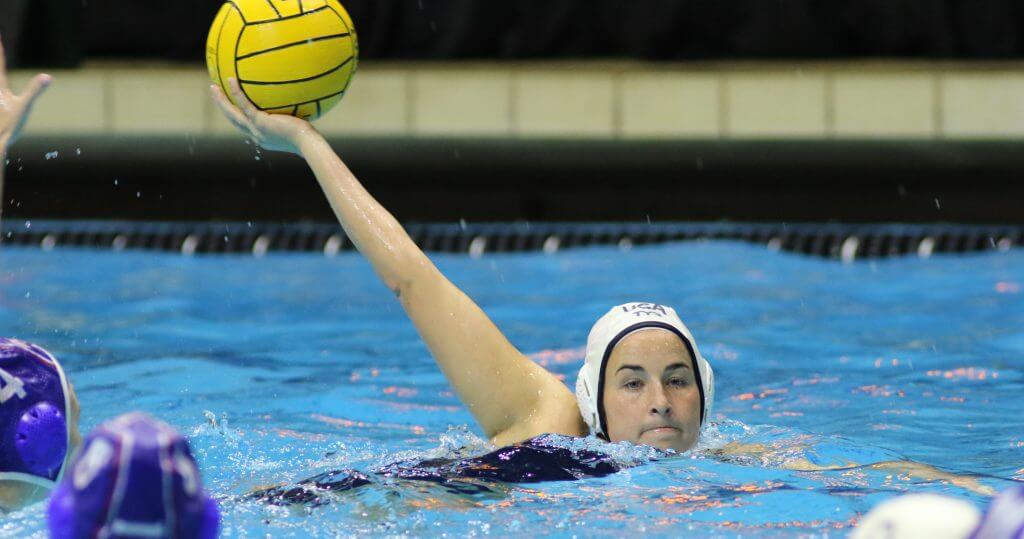
When you’ve won 68 straight games in a two-year period, and beaten everyone who plays your sport, there’s not much you can do for an encore. Except keep winning, of course, which is exactly what the U.S. Senior Women’s Water Polo Team has done, brilliantly. During competition last week at the 2019 USA Water Polo Holiday Cup in Princeton, the American women narrowly escaped an upset bid by the Netherlands, eeking out a 23-22 shoot-out win to extend an otherworldly streak.
They continued their winning ways the rest of the week, cruising to a 12-6 victory on Saturday in the Holiday Cup final to close out 2019 a perfect 37-0. Over the past two years the American women have lost just once, racking up an incredible 80-1 record.
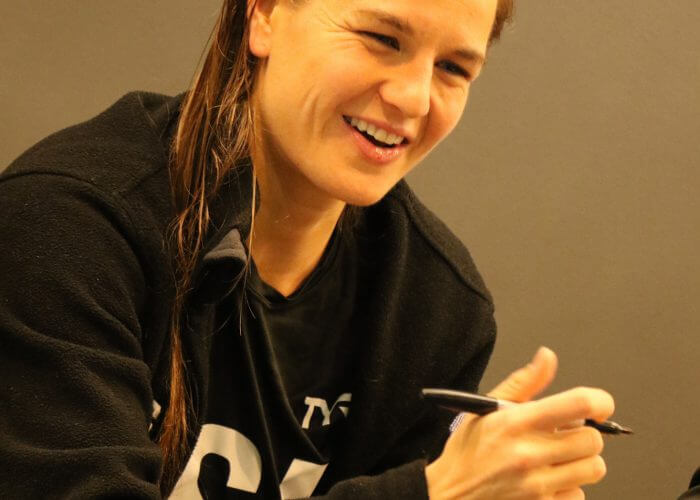
Kiley Neushul signing autographs last week. Photo Courtesy: Sherie Key/USAWP
This success is no accident. The trajectory of U.S. women’s water polo is carefully calibrated by Head Coach Adam Krikorian, who has steered the program to back-to-back Olympic gold medals in the 2012 and 2016 Games. And, they are favored to win again in 2020 at the Tokyo Games.
The Americans have the deepest roster of any women’s program in the world, which is what makes them so good. It also creates a challenging environment for athletes who are not only competing to survive final cuts for the Tokyo roster, but will have to beat out long-time friends — and even siblings.
[18th FINA World Championships: A Numbers Game for US Women’s Water Polo]
This is the situation that sisters Jamie, Kiley and Ryann Neushul find themselves in, along with teammate Jordan Raney. All have played on national championships at Stanford and have competed for the U.S. national team at every level. Kiley — a few years older than her sister Jamie and seven more than Ryann — is more seasoned than the others. She earned a Gold medal from the 2016 Rio Olympics and has competed professionally for C.N. Sabadell, a club in Barcelona, Spain.
Earlier this year Swimming World spoke with these four members of Team USA about their collective experience, the challenge of earning a spot on the world’s best women’s roster and how bloodlines and friendship are both tested —and strengthened — by a drive to be the best.
– You’re putting one set of life possibilities on hold for the allure of Olympic participation.
Jordan Raney: I’ve always wanted to be an Olympian. That’s basically it. I’ve never even imagined not trying to go for it after college. I’ve always wanted to be a part of this team.
This has always been the way that I wanted to do this part of my life.
– Jamie, the same question: to be an Olympian on the American team is probably one of the most challenging things in water polo right now.
Jamie Neushul: Yeah, especially with this group… I don’t know the exact number, but there’s a lot of returners [nine from 2016]. There was a lot of turnover from 2012 to 2016 and a lot of new faces. [Now,] a lot of those new faces are old faces.
It’s a difficult position to be in. But, like Jordan said, if you’re going to go for it, you go for it. You like to think that being a part of a process like this is going to set you up for other parts of life as well — when you want to get a job in that other professional world.
But I love water polo. I’ve been chasing it and I’m going to chase it until I feel I’m satisfied. And I feel that fulfilled my time with the sport.
– Kiley, you’ve already participated in one Olympics and here you are, going for gold again — and hoping to make history.
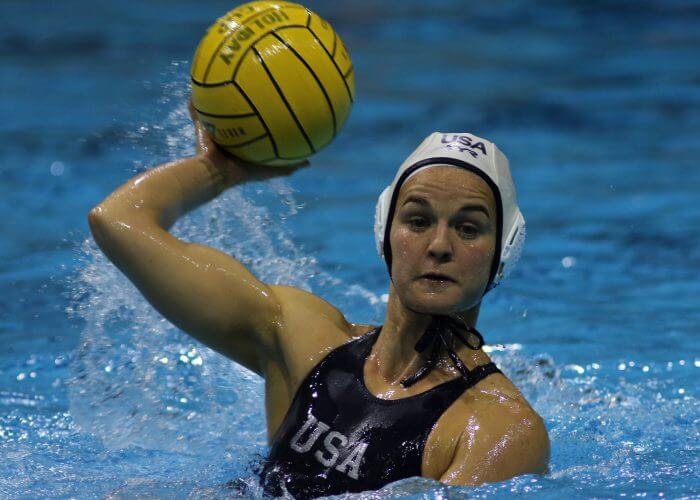
USA’s Kiley Neushul. Photo Courtesy: Sherie Key/USAWP
Kiley Neushul: I mean, I certainly hope so with that last part. That’s what drives me — having been there. You want that taste again, that entire process, everything.
I did a bit of work outside of water polo for my uncle; worked in the corporate world for a little while. It didn’t really excite me. That may have been circumstantial and where I was at because this is my first quad doing it without [being a student at Stanford]. That’s challenging.
Every year, I find inspiration in little ways. That inspiration has come from living in a different country and learning a different language, creating a new life.
My experiences where I’ve been playing in Barcelona have helped get to this point — both in water polo, finding inspiration from other teammates, new teammates, new styles, and then being able to bring that back here to this team. Although there have been days where I’m like: What am I doing?
It’s difficult without university. Those four years really translate nicely into going into the Olympic games. Last time, it was an easy flow kind of right into that full year of training.
This has been a different journey, and all the more special.
– You make the point that you had a wonderful experience the first time. Now, are you’re choosing to go back because the prize is so great? Or is it the camaraderie of this group?
Kiley Neushul: Like I said, this can’t be replicated outside of this group — I’ve searched for it in other places.
My [C.N. Sabadell teammates], they’ve been inspirational. They’ve kept me in shape. They’ve given me great experiences in games, great exposure to other teams. But this group right here… if you want to play with water polo at the highest level, you can do it every single day at Los Alamitos when we train. Whatever it is, you’re given the opportunity to not have that fear of being a try-harder or being uncomfortable expressing yourself as a player.
You can’t replicate this experience. The intimacy, the hard work, the dedication, the discipline that goes into this experience, especially with the way that this team does it and with our coaching staff, our captain [Maggie Steffens].
– Jordan, I have to believe your dad [Chris Raney] is thrilled with the path you’ve chosen. How does that impact you?
Raney: He’s very passionate about it. He definitely pushed me to try to play water polo, but me continuing on this journey wasn’t his decision. If I wanted to quit or stop, I could and he would be fine with it.
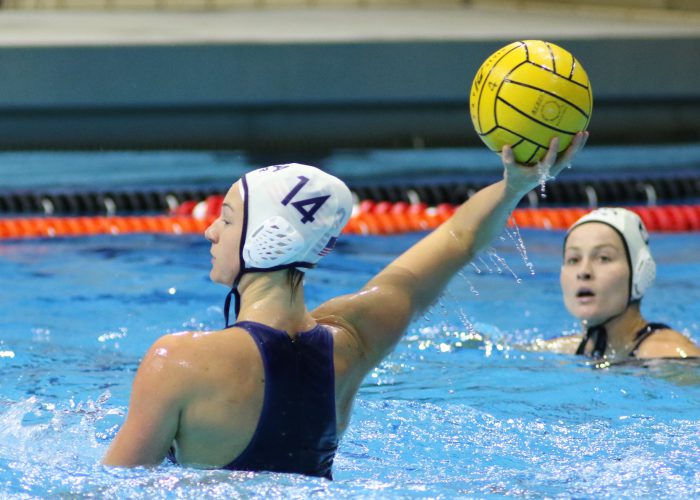
USA’s Jordan Raney lining up a shot in competition last week in Princeton. Photo Courtesy: Sherie Key/USAWP
But, he’s been a big supporter of my dream of being on this team. He’s happy that I’m enjoying it and doing something that I enjoy.
– How often does he get to see you play?
Raney: He goes to almost every tournament. A lot of times he’s the media; he takes Greg [Mescall, USAWP Director of Communication’s] place. He just appreciates water polo, he loves the game. He’s a water polo freak.
– Jamie, Kiley and Ryann — your mom and dad saw something really beneficial in water polo.
Jamie Neushul: It didn’t begin with water polo. She wanted us to be a certain way as people — tough and independent and prepared to face difficult situations and make decisions on our own. We played every sport you can think of. We eventually narrowed it down to water polo — in large part, because not a lot of girls were playing it in the US when we were young.
They definitely saw it as a good avenue to get us into a prestigious university and go from there. That goal was on our mind when we were young. We figured out we were pretty good and were really competitive. I think their goal all along was to watch us chase sports but also become good people — rather than just reaching the highest level to reach the highest level.
Always having something to chase and becoming stronger — and stronger women — because of it.
– I agree that from the standpoint of making tough, independent — all those good adjectives — polo offers fantastic opportunities for women, not the least of which is great opportunities for college, including places like Harvard.
Ryann Neushul: It was kind of a running joke for my dad. He pushed for one of us to go to Harvard. I don’t know if he was serious about it, but he tried to bribe us to go to [there]. He just thinks it’s a great school academically.
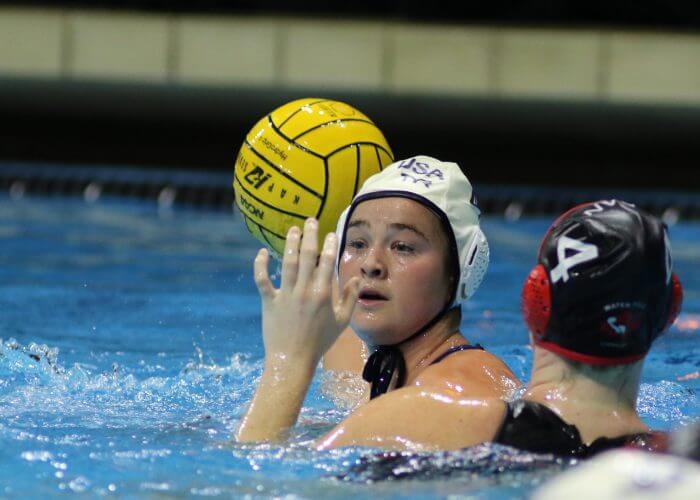
USA’s Ryann Neuschul against Canada. Photo Courtesy: Sherie Key/USAWP
We value academics more than athletics in our house. That was always number one. When we got in, he got inspired and I got inspired by [Stanford]. I didn’t know if the national team was a realistic possibility for me.
I wasn’t as… I don’t want to say as good, but I wasn’t as prominent as my sisters going through the national team system. I got cut from teams and all kinds of stuff, so I didn’t have the same experience they did.
I had to decide what competitive water polo meant to me and if I was really interested [going] forward. I eventually made the decision that I wanted to get better at polo. That’s what had me choosing Stanford over Harvard. But there were other days where I thought I was going to go to Harvard.
– You mentioned having been cut. Apparently, that did not deter you in any way. Or did it?
Ryann Neushul: It broke my heart when I was 13 on a pool deck somewhere in Southern California. [Now] I use it as a motivator. I’ve played with a chip on my shoulder ever since. I’m a smaller player, so that was always —always — an issue.
It’s hard for me to physically go up against some of these girls — or it was when I was little. So, I had to get creative about how I was going to become a better player and to compete at the highest level.
It helped me more than anything to be told no— “This isn’t for you right now.” Then just go back and try to prove them all wrong. College rolled around and it was a nice little refresh. Jordan and I got to compete on the junior team. That’s the experience where I decided that if I got a chance at the senior team, I would go for it.
– Besides polo, you all have Stanford in common. The culture that John Tanner — over his 23-year tenure — and Susan Ortwein and Kyle Utsumi and others have created is nothing short of incredible, as have been the results.
Kiley Neushul: What JT does really well — and Jamie talked about it in my family about creating confident, strong, competitive women — is he refines a lot of the wildness you have as a younger player and as a person. Because entering Stanford is definitely intimidating. You walk onto that campus and it’s: Do I belong here academically?
Realistically, I haven’t been putting in hours and hours in the classroom. I’ve been having to share that time in the pool. So, I’m possibly behind academically. But that competitive drive you acquire as a little kid — that came from our family and clearly from families like Jordan’s — it’s in all of us on this team for sure.
[MPSF Tournament Central: Catching Up With Stanford Coach John Tanner]
We had really good arrows when we were younger. My mother and my father pushed me towards academics. Knowing that I loved water polo and would be a treat for my success in the classroom versus you need to go to practice and if you’re sick you don’t have to go to school but you always have to go to practice.
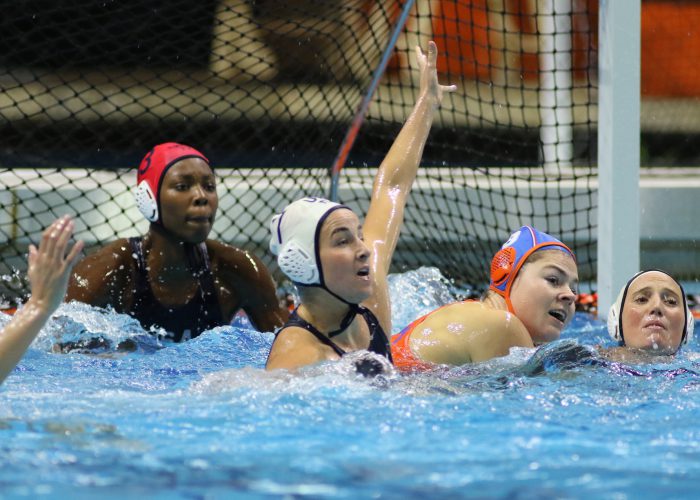
USA’s Jamie Neushul fights off Holland’s Photo Courtesy: Sherie Key/USAWP
I had friends who were like that as well, and that’s where I think that student athlete mentality is important to get you where you want to go. JT helps refine all of those great — or sometimes detrimental — qualities that you have as a young player, as a young student.
We shared our lives with our team, and while you’re there you don’t realize what you’re going through. After leaving, it was one of the greatest experiences of my life. Showing up every day on that pool deck and being challenged in different ways, not just in water polo.
– And developing your water polo skills…
Kiley Neushul: JT was really good at technical work, which is what we lack a lot in youth water polo here. For example, controlling the ball with your wrist is underrated in youth water polo in general and on the women’s side.
JT really helped with that. I mean I could just move my wrist, be deceptive, just little things that really changed my game. Certain movements in the water that he defined for us that we did, but he put a name to those movements and had them in your head. After doing them for four years, every day, working on those fundamentals, refining the skills that you had as a high school athlete and then giving you more tools in your toolbox.
Also —this is a funny story. Maggie Steffens and I were playing in the Final Four championship [in Europe] this past April. We were down 11-8 going into the fourth quarter. After the game, we were both talking about it, we ended up winning 13 to 11. Both of us, in the middle of the fourth quarter were like, okay: Five minutes and 27 seconds left. That means we’ll have at least five possessions. We’ve got to mathematically break the game down, which is an exercise that JT took us through.
– Brad Schumacher explained that Tanner set up a program for him to compete at two different Olympic sports; one as a swimmer, where he won Gold, and the other in water polo with the U.S. men. It was all because of planning.
Jamie Neushul: JT’s definitely the man with the plan.
– Does that sound like Coach Krikorian?
Raney: He’s a man with the plan too. Absolutely. [But] it’s tough to compare Tanner and Krikorian, because with Tanner, he also had academics [to deal] with.
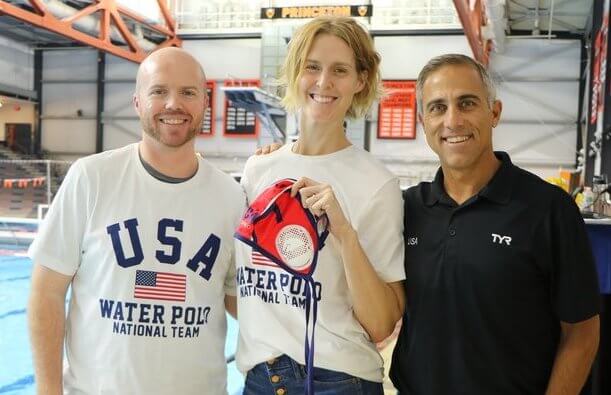
Greg Mescall, Betsey Armstrong, Adam Krikorian. Photo Courtesy: Sherie Key/USAWP
I respect Tanner because he did give us the time in the classroom. He knew that academics was a priority in our life and he respected our time. And was flexible; if something in our academic life was more [of a] priority. For example, if we had a class that was right after practice, he would say: Okay, get out a few minutes early.
It’s hard to compare [with Krikorian] because he doesn’t have academics. But they both have plans about what we’re going to do every day.
– As the best team in the world, how do you deal with expectations for success?
Raney: I would say just never be satisfied. We’ve played these teams a lot, but just never being satisfied with the last game and you’re only as good as your next performance. So just never being complacent.
– But complacency is part of the human condition. Take your game against Italy in June (for the FINA World League Super Final title and a spot in the Olympics). There was so much to play for — and the Italians gave you everything you could handle.
Kiley Neushul: I think we’ve seen the Italians twice now since the final game in Rio, [so] underexposure was definitely at play. Ashleigh Johnson played over in Italy, and they play a crazy style that’s not the same as ours. I think underexposure to that team and in general we need more exposure as a team to these European teams. We’ve had a lot of success in the last couple of years and complacency is always a fear of our coach and of every single member of this team.
Which is why we set the bar high every day to create that level of competition in our practices. If you were at practice [in June], you would have been like: Oh my God, those girls are out there competing every second.
With as much time as we spend together and as little competition and exposure that we’ve gotten these past three years to European teams… we can’t be complacent. That was a great wake up call for us against Italy.
[With 11-2 Win over Italy U.S. Women Sweep to USA Water Polo Holiday Cup Final]
We went months without training and then we showed up at an Olympic qualifier where we were flowing pretty good. We had some all-star plays that got us through. [They were] purely competitive, gnarly players who stepped up in big moments for us.
I think that’s a testament to our team culture. However, we also got a taste of that complacency and we panicked a bit in that game. I think the Italians are definitely hungry for us. I think the Italians, the Dutch, whoever, I mean, any country with water polo, the water polo national team and they’re going for it.
That’s why it’s important every day we show up and we create that competition in our training sessions and hold ourselves to a high standard. Adam does a really good job of that.
But we need to keep chasing that, that sort of always getting better. There’s always a little bit faster, always a little bit stronger. That comes with a lot of discipline and preparation on the individual level as well. That’s where our maturity will be tested.
– There’s 17 people on the roster, and you’re potentially one of the folks that’s going to have to make a statement in these so-called friendlies. How does it motivate you knowing that it’s not just your team doing well, but that you need to impress the coaching staff that you should be on the Olympic roster?
Jamie Neushul: That’s the challenge we face every single day. You can play well in games, but maybe you had awful training and that’s the reason you’re not on the team. You’re being tested every second that you’re here — with every rep of everything that we do, [Krikorian] creates an environment where we have to compete against each other.
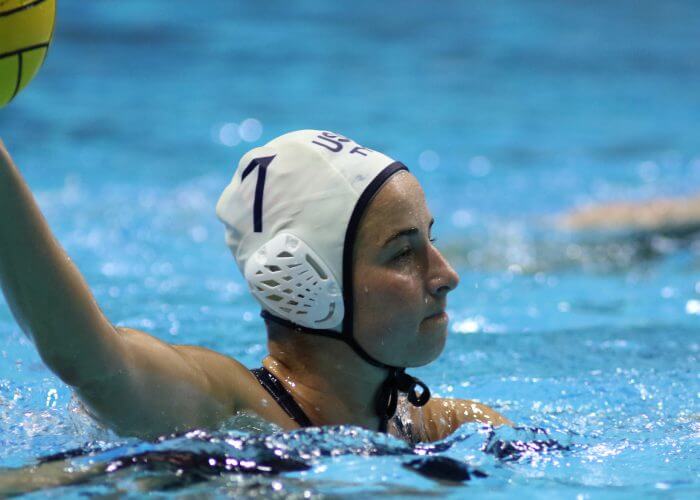
USA’s Jamie Neushul. Photo Courtesy: Sherie Key/USAWP
I can confidently say that I fail at something every day in that pool. It didn’t happen as much at Stanford. It didn’t happen in Santa Barbara. It’s a new experience. And every time you feel that failure, it sucks and it makes you hungrier for another opportunity to prove that [you] can get better.
There’s a fine line between looking at a series and thinking: I can’t make any mistakes, I have to go out and I have to play perfect because it’s going to make or break whether I make this roster. We also have to find joy in what we’re doing.
That’s a battle that I struggle with every day. You’re doing this to make an Olympic team, but you’re also doing it because you love water polo. I want to have fun when I play with my teammates. I don’t want to look at a teammate and hope that they fail so that I look better. It’s really just… our main goal is to play beautiful water polo and further the sport and make this work better than it is and better than it was in 2016.
We want to play the best water polo that any team has ever played in the world. Win or lose.
Raney: Of course, I want to play well. I want to put myself in a position to make every team. More than anything, I want to play good team water polo with my teammates. I think if you interviewed all of us, we’d all agree on that and you know, we’ll see,
You hope for the best and just play your hardest. That’s all you can do.




